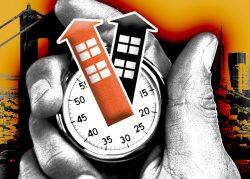San Francisco handed out few housing permits last year, but building officials expect activity to pick up in 2024.
The Department of Building Inspection expects legislative and internal reforms to put a fire on the issuance of permits for new housing, the San Francisco Examiner reported.
“We’re making systemic changes,” Patrick Hannan, a spokesman for the department, said in an email to the Examiner. “That will make a big difference in the coming year.”
Last year, developers applied for fewer housing-related permits than in any other since 2018.
But permit review times within the city’s building department were faster last year than in 2022, and a housing law that came into effect this month is intended to further speed up the process in San Francisco, where permit applications have slowed to a crawl.
The city issued building permits for 856 new housing units through October of last year, according to preliminary U.S. Department of Housing and Urban Development data. Data for November and December was not immediately available.
But if the trend continues, San Francisco would be on track to issue fewer permits than in any year since 2011.
Building inspectors also had fewer permits to review. That’s because 292 housing-related permits were actually filed with the department last year, 44 percent fewer than in 2022, when 525 housing-related permits were filed, according to data shared with The Examiner.
The department defines housing-related permits as those filed with a residential occupancy code in which the proposed number of units listed is greater than the existing total.
Sam Moss, the executive director of the nonprofit Mission Housing Development, said the effect of the pandemic likely played a role in the decline.
Builders were hit by construction costs rising amid inflation and supply-chain shortages.
Costs have continued to increase, Moss said, as rising federal interest rates over the last two years have affected credit markets and made it “very expensive to get money to build housing right now.”
“(Now) there aren’t people ready to file for new permits,” he said. “I actually think that is one of the few things in real estate that makes a lot of sense right now.”
The Federal Reserve signaled in December it expects three rate cuts in 2024, which would make it less expensive for developers to borrow money, which in turn could spur more of them to file permits for new housing construction.
Internal and legislative reforms should streamline the process to review and issue housing permits in 2024.
When AB 1114 took effect Jan. 1, prospective builders were no longer able to apply for building permits without prior zoning approval from the Planning Department. The department said the bill by former San Francisco supervisor and current Assemblyman Matt Haney, “will likely reduce the issuance times for housing-related permits by at least 50 percent.”
Starting this year, most permit applications to build new housing must be submitted electronically, enabling applicants to track their permit status in real time.
“DBI has improved dramatically over the past three years under Patrick O’Riordan’s leadership,” Hannan said of the department director, who has served in the role since 2020 in the aftermath of a public corruption scandal involving building inspectors. “We’re changing the culture, have instituted numerous reforms and are making operational improvements to improve our permitting times.”
The average wait to get a full building permit for an apartment project in the city was 627 days in December 2022, with the same wait for a single-family home permit taking 861 days, the longest timeline for any city in the state, according to a San Francisco Chronicle analysis.
— Dana Bartholomew
Read more



